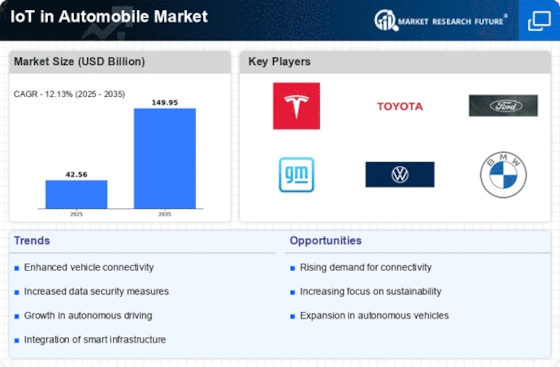Top Industry Leaders in the Automobile IoT Market

Competitive Landscape of IoT in Automobile Market:
The Competitive Landscape of IoT in the Automobile Market is dynamic, reflecting the rapid evolution of technology in the automotive sector. Key players in this landscape are continually adapting their strategies to gain a competitive edge, while new and emerging companies seek to disrupt the market with innovative solutions. Market share analysis is influenced by several factors, including product offerings, partnerships, and investment trends. Here's a comprehensive overview:
Key Players:
- Texas Instruments Inc. (U.S.)
- Intel Corporation (U.S.)
- NXP Semiconductors N.V. (Netherlands)
- TOMTOM N.V. (Netherlands)
- Cisco Systems Inc. (U.S.)
- Microsoft Corp. (U.S.)
- Thales SA (France)
- IBM Corporation (U.S.)
- AT&T Inc. (U.S.)
- Vodafone Group (U.K.)
- Robert Bosch GmbH (Germany)
- Google Inc. (U.S.)
- Apple Inc. (U.S.)
- General Motors (U.S.)
- Audi AG (Germany)
- Ford Motor Company (U.S.)
Strategies Adopted:
- Partnerships and Alliances: Key players often form strategic partnerships to enhance their offerings. For instance, collaborations between automakers and technology companies enable the integration of IoT solutions seamlessly.
- Product Innovation: Continuous innovation is crucial. Companies invest heavily in developing advanced sensors, connectivity modules, and software to stay ahead in the competitive landscape.
- Focus on Cybersecurity: With the increased connectivity, there's a growing emphasis on cybersecurity. Companies are investing in robust security solutions to safeguard connected vehicles from potential cyber threats.
- Global Expansion: Given the international nature of the automotive market, key players focus on expanding their presence globally to tap into emerging markets and diversify their consumer base.
Factors for Market Share Analysis:
- Technology Integration: The seamless integration of IoT technologies into automobiles is a critical factor. Companies that can offer comprehensive and interoperable solutions tend to gain a larger market share.
- Customer Relationships: Building and maintaining strong relationships with automakers is crucial. Companies that can establish themselves as reliable partners for OEMs often secure a significant market share.
- Regulatory Compliance: Adherence to industry standards and compliance with regulatory requirements is a key determinant of market share. Companies that can navigate and adapt to evolving regulations effectively gain a competitive advantage.
New and Emerging Companies:
- Aurora Labs: Focused on cybersecurity for connected vehicles, Aurora Labs provides self-healing software solutions to detect and fix software anomalies in real-time.
- Cognata: Specializing in simulation solutions for autonomous vehicles, Cognata allows companies to test and validate their IoT applications in a virtual environment.
- Rivada Networks: Offering advanced communication solutions, Rivada Networks specializes in providing secure and reliable connectivity for connected vehicles, emphasizing the importance of robust communication infrastructure.
- Valens Semiconductor: Valens focuses on in-vehicle connectivity solutions, providing high-speed data transmission for advanced driver assistance systems (ADAS) and other connected car applications.
Current Company Investment Trends:
- 5G Connectivity: Companies are investing heavily in the development and implementation of 5G connectivity for connected vehicles, enabling faster and more reliable communication.
- Edge Computing: Recognizing the need for real-time data processing, there is a growing trend in investing in edge computing solutions to handle data locally within the vehicle.
- Data Analytics: With the increasing amount of data generated by connected vehicles, companies are investing in advanced analytics to derive valuable insights for improving vehicle performance, predicting maintenance needs, and enhancing the overall driving experience.
- Electric and Autonomous Vehicles: Investments in IoT for electric and autonomous vehicles are on the rise, as companies anticipate the growth of these segments in the automotive market.
Latest Company Updates:
Ford Invests in LiDAR Startup to Advance Autonomous Vehicles: On January 9, 2024, Ford announced a strategic investment in Luminar Technologies, a LiDAR startup developing high-resolution sensors for autonomous vehicles. This partnership aims to accelerate the development and deployment of self-driving cars by leveraging Luminar's advanced LiDAR technology.
BMW Showcases "iX Flow" with E Ink Technology: At the CES 2024 tech show in Las Vegas, BMW unveiled the "iX Flow" concept car featuring E Ink technology that allows the exterior color to change dynamically. This innovation opens doors for personalized car customization and enhanced safety visibility in low-light conditions.
GM and Honda Partner on V2X Communication for Safer Roads: General Motors and Honda have joined forces to develop Vehicle-to-Everything (V2X) communication technology that enables cars to communicate with each other and with infrastructure like traffic lights. This collaboration aims to improve road safety by allowing vehicles to share real-time data on traffic conditions, hazards, and potential collisions.
Bosch Develops AI-powered Parking Assistant: Bosch has introduced a new AI-powered parking assistant that automatically steers and controls the car during parking maneuvers. This system utilizes sensors and cameras to navigate tight spaces and avoid obstacles, making parking a stress-free experience for drivers.
Hyundai Announces $400 Million Investment in Autonomous Driving In December 2023, Hyundai Motor Group pledged $400 million to establish a new autonomous driving research center in the United States. This investment signifies the company's commitment to developing Level 4 and Level 5 self-driving technology for future vehicles.










